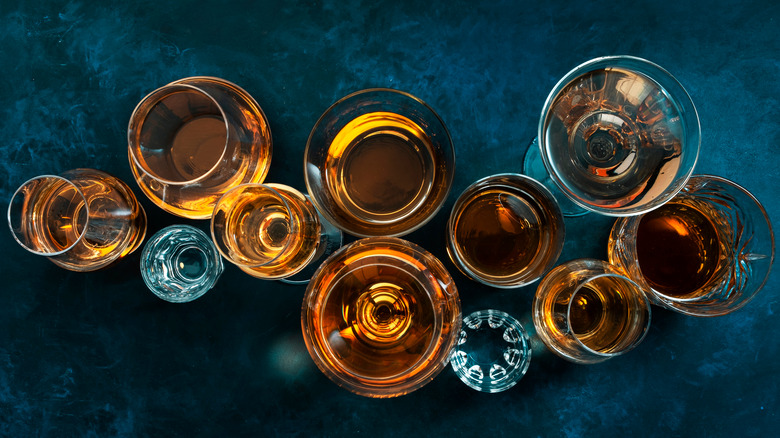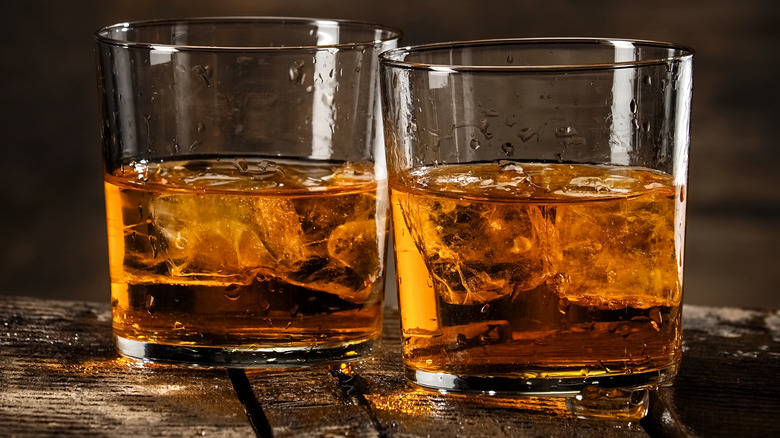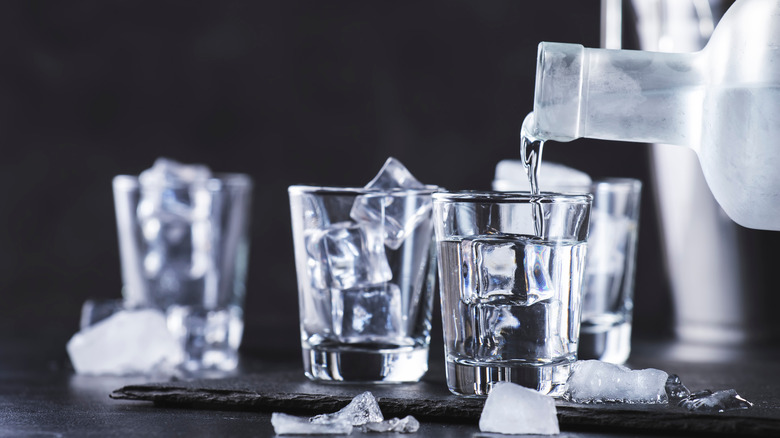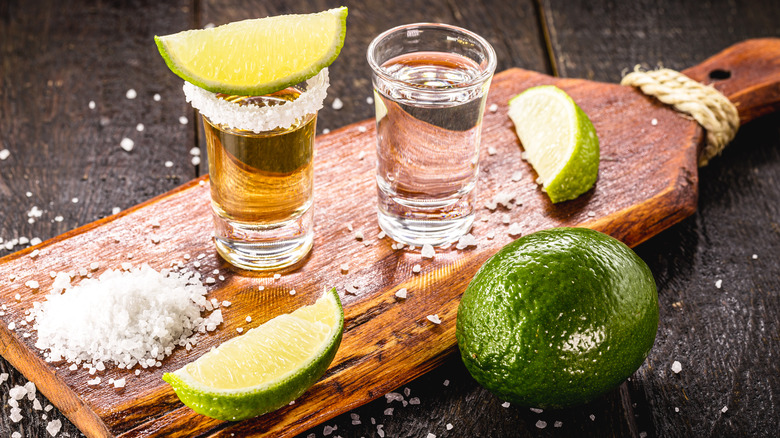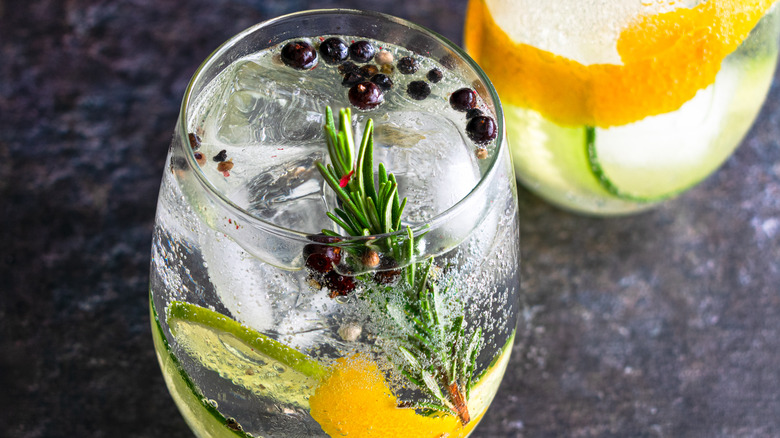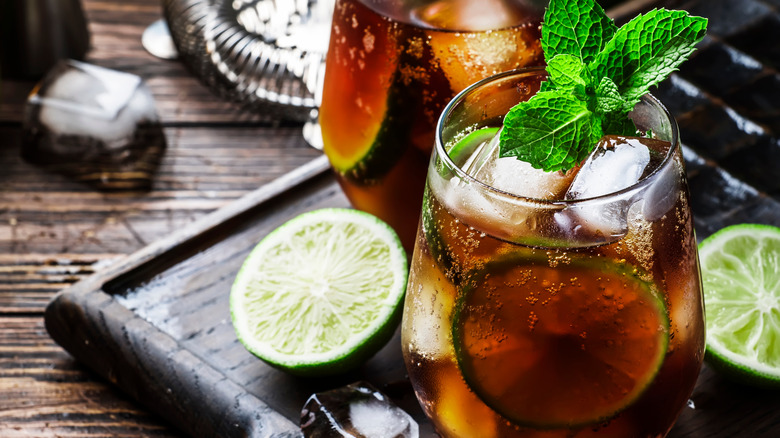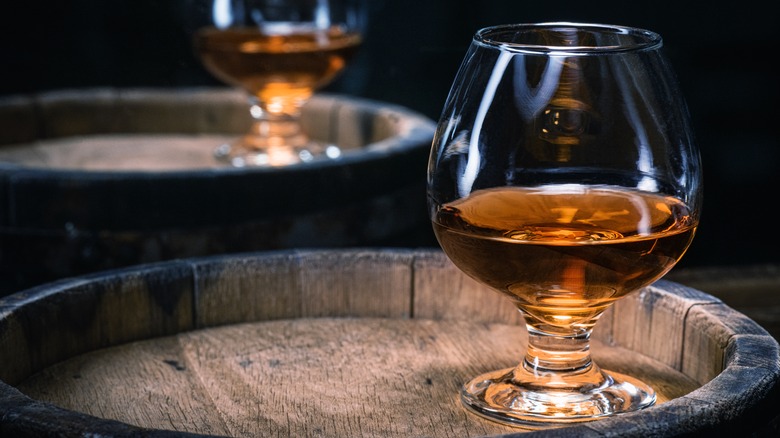Here's When Different Types Of Liquor Really Expire
It's not unusual to buy a few liquors for a cocktail party, and then leave half-empty bottles, (or half-full if you're a positive person), languishing in the back of a cupboard. While you'll hopefully remember how old a bottle of spirits is, how do you know if it just needs a dusting off and a fresh pour, or whether it needs to be poured down the drain? And, is it safe to drink, or is it just a matter of taste? First off, it's good to be clear about what liquor actually is, and there are six different types, namely: whiskey, vodka, tequila, gin, rum, and brandy, (via Marketview Liquor).
What you'll find out is that it's not so much that liquors expire, but that the shining qualities they once possessed may have waned. While a little less taste may not deter you from tucking into tequila to make a margarita, you may want to sip an after-dinner Cognac that's as fine as the day it was bottled. This means that you need to know the best time period to drink liquors within to taste them at their best. It also means that what you really need to be aware of is how best to stop liquors from tasting as if they've expired. That way you can keep them for a little longer. You might be surprised by how quickly many liquors can start to lose their appeal. So, read on and research how to make some classic cocktails, too.
Whiskey
There are plenty of different types of whiskey, each with its individual flavor profile and unique characteristics. The age-old love for American whiskey, bourbon, and Tennessee, continues unabated. Other whiskeys include Canadian whisky made from cereal grain. There's also Scotch made from malted barley and Irish whisky from malted cereal grains. Rye whiskey is similar to bourbon but has a specific minimum grain content, notes The Three Drinkers.
Director of Spirits Education at Moonshine University, Colin Blake tells Gear Patrol that as soon as a whiskey bottle is opened, oxygen begins to impact the liquor. In fact, oxidization speeds up the more air there is in a bottle. While the whiskey won't spoil, he notes that "whisky can adopt earthy, graphite, off-putting, textile-y flavors". It's recommended to store bottles away from fluctuating temperatures and drink within a few months. Blackened Whiskey suggests that if you've got 25% or less of a bottle left, then finish it within six months, but if it's 75% or more full, it could last a year or two. Store whiskey upright if it's got a cork in the top to make it more secure, and twist caps and corks intermittently to make sure they're tight. Bourbon can taste bitter and watery if stored at the wrong temperature, exposed to sunlight, and left open for too long.
Vodka
Vodka is the number one spirit sold in the U.S., although tequila could beat it to the top spot in the near future, reports CNBC. Just to give you some idea of its popularity, vodka sales in 2021 in the U.S. stood at $7.3 billion, which translates to 78.1 million cases, with each case being 9 liters. That's a lot of bottles, (via Distilled Spirits Council of the United States). There are a lot of choices too, with one of the best brands being Reyka, which is filtered with Icelandic lava rocks.
Grey Goose sponsored the U.S. Open Tennis Championships in 2022 and has done so for nearly two decades. The French brand recommends keeping opened bottles in a cool, dry place or even better, in the fridge. This isn't to stop them from being unsafe to drink, but rather to preserve the quality. If the seal hasn't been broken then the vodka will retain its freshness. However, flavored vodkas do have a shelf life and the advice from Grey Goose is to consume their brand within a few months. Absolut vodka brand suggests its flavored vodkas are best polished off within a couple of years. Even after a year opened vodka is fine to drink, it just might not taste as good as it did, depending on how it's been stored. Vodka is a great culinary ingredient, too. It's superb to cook with, and pasta dishes can be elevated with this potent liquor.
Tequila
Tequila is a liquor that's a variety of agave-distilled mezcal made from the Blue Weber agave. The demand for this potent spirit is skyrocketing in the U.S., according to the Spirit Distillers Council of the United States. This meteoric rise has seen demand for super-premium tequila rise by over 1,000% in 20 years. One of the reasons for this is that there's just so much choice out there and it's appealing to so many more people than ever before. However, since tequila slammers on a work night are not the way forward, it could be that your bottle and shot glasses are only brought out when it's time to party.
Unopened, you've got years to enjoy a bottle of tequila. If it's opened, it's good for years, too — depending on how you store it. Tequila warms you up and it doesn't like the cold either, so keep it away from the fridge. It likes temperatures of around 50F to 55 F, so store it in a place that's shaded and not too hot. Use an airtight seal rather than a porous cork. Mezcal Rosaluna advises drinking mezcal and tequila within a year. Although they contain different amounts of agave, the alcohol content is roughly on par, and this is what counts. It won't make you ill beyond this timeframe, unless you have too much, that is, but it'll start to degrade. That means it won't look as on point, taste as fresh, or smell as good.
Gin
You've probably noticed that there's been a real gin trend in recent times in the U.S. and other parts of the world such as the U.K. In 2022, revenue in the gin sector reached $2.57 billion, with an expected annual increase of 9.3% until 2025, (via Statistica). The Distilled Spirits Council of the United States links this growth to the rising popularity of cocktails, many of which use gin. You may not have bottles around long enough to worry too much about expiration dates. However, knowing how long your base liquor is good for is worthwhile.
Unopened gin is going to last unless it's subjected to sunlight or a direct heat source. The same goes for an opened bottle. However, while it's not going to go "bad" as such as soon as oxygen hits the liquor, it will start to deteriorate in terms of quality. With this in mind, you really want to be drinking gin within a couple of years of opening it. The less you've got in the bottle, the more rapidly it will lose its tasting notes. So either drink it up or decant it into a smaller bottle. The spirit should be stored in a dark, cool place, and the fridge or freezer is perfect. There are plenty of gin brands out to sample, such as Pickering's Gin.
Rum
The history of rum is as rich as its flavor is intense. Molasses from Europe were sourced in the U.S. by local producers as a side business, (via Distiller). This was as long ago as the beginning of the 17th century, adds Wine Enthusiast. Over the years, what's classed as the first spirit of the U.S. has become a largely imported liquor. Today, more than half of all rums purchased in the U.S. are spiced varieties or flavored in some way, notes the Distilled Spirits Council of the United States. Rum is a base liquor in cocktails such as mojitos, Cuba Libres, and tiki cocktail the Painkiller.
To get the best quality out of an open bottle of rum, it's best to drink it within six months, which gives you plenty of excuses to host a cocktail party or two. However, it won't ever go bad. Unopened rum will last for centuries. Once you crack it open, it'll just start to be past its prime in terms of how good it tastes. Montanya Distillers notes how bacteria could flourish in a low-alcohol rum if it's left unsealed or is opened and closed fairly often. Real corks can also become contaminated in a way that synthetic ones don't. Rums flavored with infusions may taste pretty rank quite quickly while storing rum in plastic is a no-no as the alcohol can react with it over time. Use up your rum as an ingredient and make our delicious Caribbean rum cake.
Brandy
Between 2016 and 2021, brandy sales in the U.S., including Cognac, have risen substantially, and in the super-premium category, the increase has been by 112%. By the end of this period, revenue generated was $3.5 billion, which in terms of the number of 9-liter cases, it equates to 16.5 million, (via Spirit Distillers Council of the United States). Brandy is a liquor that's made from fruit juice, while Cognac is a type of brandy that's produced in the eponymous French region and is aged in a particular way, in a barrel. Cognac must be made from white grapes, and Armagnac is similar to Cognac but is distilled once rather than twice.
Because the alcohol content is high, a brandy bottle (opened or not), won't expire. However, it can turn sour, quite literally, if it's kept for years. While best finished within six months, you probably won't notice the quality changing until after a year or two, notes BlackTailNYC. Once opened, the alcohol will reduce, however, you'll know by sight and smell whether your liquor is good enough. Leading Cognac brand, Martell advises storing bottles upright to keep the cork intact as this can impact quality. Another tip is to store opened brandy in smaller vessels to reduce oxidization and drink within a few months. While a distilled eau-de-vie that's blended to make Cognac can be matured over decades, you may want to drink this liquor a little quicker.
